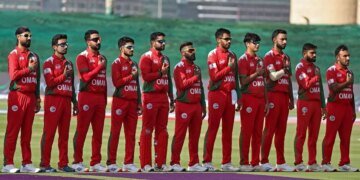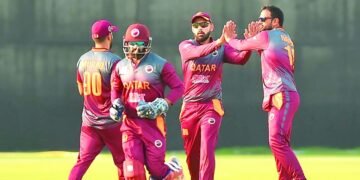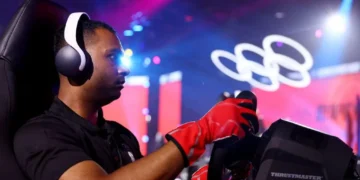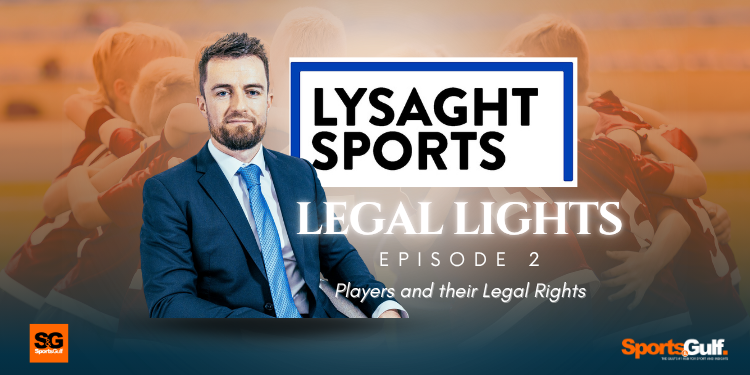A player’s primary focus is his performance on the pitch. But what happens when off-field legal issues threaten to get in the way? In this issue of Legal Lights, Barry Lysaght breaks down the key legal points that every player needs to know to protect their rights.
How do I know which agent to trust?
Players are not obliged to use an agent, but if they do, the agent must hold a FIFA Football Agent licence.
This is not just a guideline, but a strict obligation: FIFA can sanction players who engage unlicensed individuals to carry out agent services for them. If you are approached by an agent, make sure to ask to see their FIFA licence first. The licence will have a QR code which you can scan to ensure the licence is valid.
How long should my employment contract be?
Under FIFA rules, the minimum length of a player’s employment contract runs from its start date until the end of the season: no shorter term is possible. If the player is aged 18 or over, the maximum length is 5 years (although longer contracts are permitted if national law allows). For players aged under 18, the maximum length is 3 years. In 2024, the average contract length of players who were transferred internationally was 18 months, with over half of all contracts ranging between 6 and 24 months.
Can I get a cut of my future transfer fee?
Most employment contracts follow a set format: a fixed salary, supplemented by loyalty bonuses or performance-related payments. However, did you know that, as a player, you can also negotiate a payment from your future transfer fee? FIFA rules permit a player to agree an employment contract which entitles him to receive specific compensation (a lump sum or a percentage) from his future transfer fee. However, it is vital to obtain advice from a football lawyer beforehand – errors in how such clauses are drafted may result in FIFA sanctions for breach of its ban on third-party ownership.
Can I unilaterally terminate my employment contract?
Players are expected to respect and honour their employment contracts. Termination should always be an action of last resort.
However, FIFA recognises that players may have a valid justification for terminating their employment contracts in certain circumstances (i.e. ‘just cause’). The club must have committed a breach of its obligations that is serious enough to make it unreasonable to expect the player to continue the contractual relationship. Some of these justifications are discussed below.
If you’re thinking of terminating your employment contract, make sure you consult a football lawyer first – timely legal advice is critical to ensure that you avoid any possible financial and sporting sanctions and can continue your career unimpeded.
My club has not paid me on time. Is there anything I can do?
Players have several legal remedies at their disposal when clubs fail to pay salaries on time.
If a club fails to pay a salary payment within 30 days after the due date, it is liable to FIFA sanctions – including fines and even transfer bans. To activate this, the player must first give the club written notice of its default and give the club at least 10 days to comply with its financial obligations.
If a club fails to pay 2 or more monthly salaries on time and has no lawful justification for the delay, then a player may terminate his contract, provided he has put the club on notice in writing and given it a deadline of at least 15 days to comply.
When correctly used, these can be powerful legal tools to help players obtain payment.
What if my club stops picking me?
It is possible for ‘established professionals’ to also terminate their contracts prematurely if they appeared in less than 10% of their club’s official matches over the course of the season. An ‘established professional’ is generally considered to be a player aged 23 or older, who – at the start of the season – had a reasonable expectation of being a regular player. The player’s circumstances can affect this, however: a second-choice goalkeeper, for example, would have less expectation than an outfield player, as might an older player.
I want to transfer to a new club, but my current club will not release me from my contract. I’m considering refusing to train to force them to transfer me.
If a player refuses to train or play without a valid justification (such as injury or illness), with the aim of forcing his club to terminate the contract, this is considered by FIFA to be ‘abusive conduct’. While you might succeed in forcing the club to terminate your contract, the club would do so with ‘just cause’ – meaning you would be liable to pay damages in compensation to the club (and also receive a ban if the termination occurs during the Protected Period).
I have not been playing well in matches recently. Can my club fire me for bad form?
No. Poor sporting performance is not a valid basis for a club to terminate your employment contract – even if the contract has a clause to that effect.
Does it matter when I terminate my contract?
Yes, timing matters. FIFA rules refer to the ‘Protected Period’, which is the period during which a club’s employment of a player has special additional protections. This means that certain extra consequences apply, which are intended to deter the player from terminating during that time.
If a player is under 28 when he signs an employment contract, then the first 3 years of that contract are a ‘Protected Period’. If he is over 28 when he signs the contract, then the first 2 years of the contract are a ‘Protected Period’.
If a player terminates his contract during the Protected Period and does not have a proper legal justification for doing so, he can be subject to heavy sanctions, including damages and a minimum 4-month playing ban (rising to 6 months if there are aggravating factors).
The purpose of this rule is to grant clubs stability during the first few years of the contract. A player can still terminate his contract during the Protected Period, and if he can prove that he had just cause for doing so, then no sporting sanctions will apply to him. However, given the serious consequences that apply if the termination is without ‘just cause’, players should always seek legal advice before taking action.
Need to speak to a football lawyer?
Barry Lysaght is a senior football lawyer and an expert in player contracts. With over 13 years of experience at major bodies like FIFA, AFC, and the Saudi Arabian Football Federation, Barry is a trusted legal advisor on all football legal matters.
Make sure you’re protected. Contact Barry today to set up a consultation:
W: https://www.lysaghtsports.com
Disclaimer: This article provides general information on sports regulations and is not intended as legal advice. For advice on specific matters, contact Lysaght Sports directly.
































